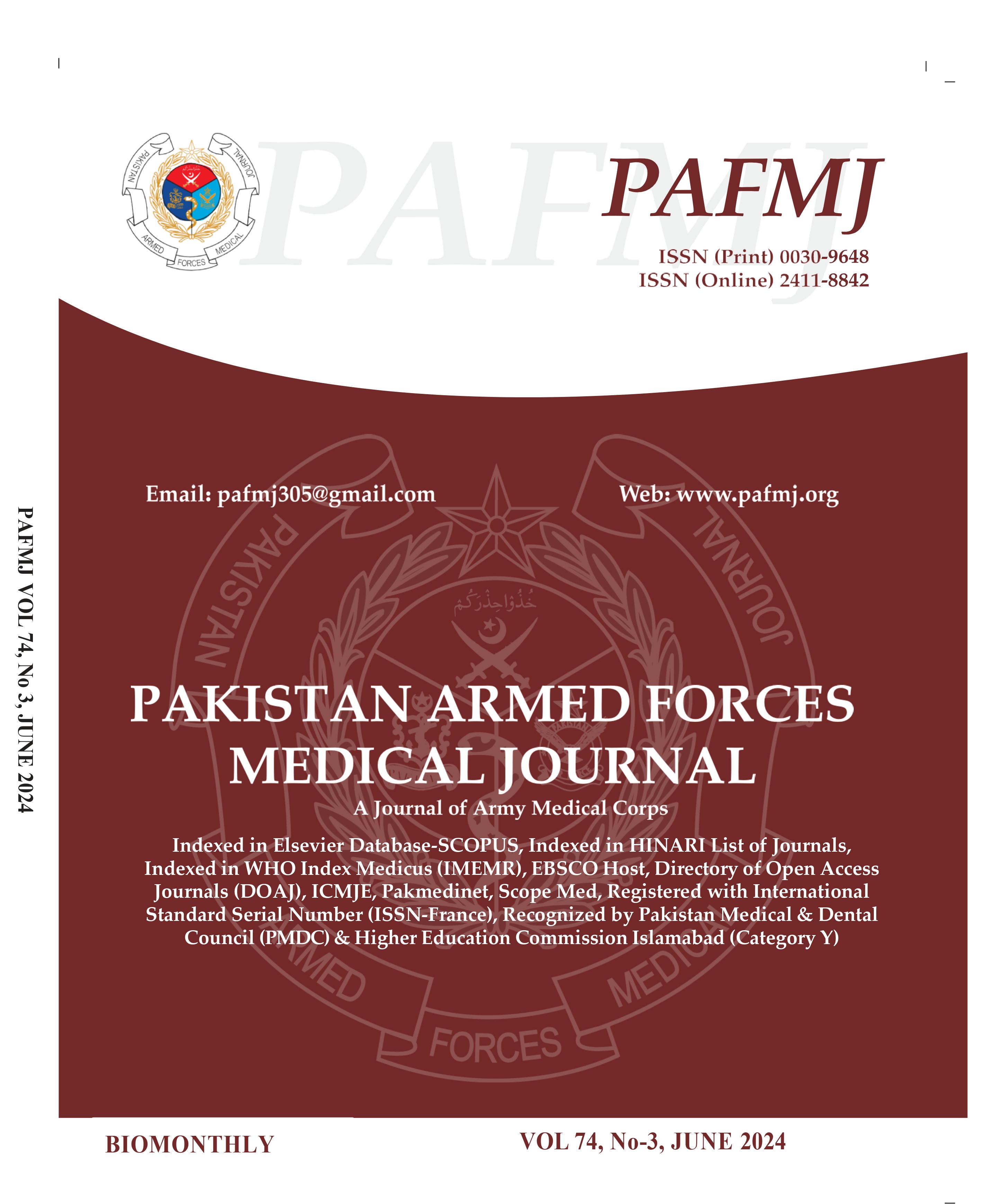Frequency of Postpartum Depression Among Covid-19 Affected Mothers
DOI:
https://doi.org/10.51253/pafmj.v74i3.5081Keywords:
COVID-19, Obstetrics, Postpartum DepressionAbstract
Objective: To evaluate the frequency of Postpartum depression among COVID-19 affected mothers.
Study Design: Comparative cross-sectional study.
Place and Duration of Study: Obstetrics and Gynaecology Department of PEMH, Rawalpindi Pakistan, from Jun to Aug 2020.
Methodology: A validated questionnaire was used to collect patient data regarding demographic profile and after which questions were asked to calculate Edinburgh Postnatal Depression Score from both COVID-19 positive and negative mothers, 6 weeks after delivery. A score of more than 12 was considered statistically significant for postnatal depression.
Results: Total number of women included in the study were 50(38% COVID-19 positive). The frequency of postpartum depression was 9(47.4%) among COVID-19 affected mothers and 16(51.6%) in COVID-19 negative mothers. Amongst COVID-19 positive cases, 14(73.7%) were found to be having less than 1 week of COVID-19 positivity, all 19(100%) were practising isolation, 12(63.7%) had less than 7-days of hospitalization,1(5.3%) was admitted in Intensive Care Unit, all were satisfied with staff support, 13(68.5%) had a fear of stigma and 1(5.3%) was found to have fear of unemployment.
Conclusion: COVID-19 pandemic has had a strong psychological impact on all postpartum mothers irrespective of their infectivity level. This study has highlighted the alarmingly high frequency of postpartum depression in both COVID-19 positive and negative mothers as indicated by high Edinburgh Postpartum Depression Scores (EPDS)
Downloads
References
Wang C, Pan R, Wan X, Tan Y, Xu L, Ho CS, et al. Immediate psychological responses and associated factors during the initial stage of the 2019 coronavirus disease (COVID-19) epidemic among the general population in China. Int J Environ Res Public Health 2020; 17(5): 1729.
https://doi.org/10.3390/ijerph17051729
Talevi D, Socci V, Carai M, Carnaghi G, Faleri S, Trebbi E, et al. Mental health outcomes of the CoViD-19 pandemic. Riv Psichiatr 2020; 55(3): 137-144.
https://doi.org/10.1708/3382.33569
Torales J, O’Higgins M, Castaldelli-Maia JM, Ventriglio A. The outbreak of COVID-19 coronavirus and its impact on global mental health. Int J Soc Psychiatry 2020; 66(4): 317-320.
https://doi.org/10.1177/0020764020915212
Li W, Yang Y,. Progression of mental health services during the COVID-19 outbreak in China. Int J Biol Sci. 2020; 16(10): 1732.
https://doi.org/10.7150/ijbs.45120
Yang Y, Lu Q, Liu M, Wang Y, Zhang A, Jalali N, et al. Epidemiological and clinical features of the 2019 novel coronavirus outbreak in China. medRxiv 2020.
https://doi.org/10.1101/2020.02.10.20021675
Dong M, Zheng J. Letter to the editor: Headline stress disorder caused by Netnews during the outbreak of COVID‐19. Health Expect 2020; 23(2): 259.
https://doi.org/10.1111/hex.13055
Wu Y, Zhang C, Liu H, Duan C, Li C, Fan J, et al. Perinatal depressive and anxiety symptoms of pregnant women during the coronavirus disease 2019 outbreak in China. Am J Obstet Gynecol 2020; 223(2): 240-e1.
https://doi.org/10.1016/j.ajog.2020.05.009
Zimmermann P, Curtis N. COVID-19 in children, pregnancy and neonates: a review of epidemiologic and clinical features. J Pediatr Infect Dis 2020; 39(6): 469-477.
https://doi.org/10.1055/s-0040-1710542
Cox JL, Holden JM, Sagovsky R. Detection of postnatal depression: development of the 10-item Edinburgh Postnatal Depression Scale. Br J Psychiatry 1987; 150(6): 782-786.
https://doi.org/10.1192/bjp.150.6.782
Almeida M, Shrestha AD, Stojanac D, Miller LJ. The impact of the COVID-19 pandemic on women’s mental health. Arch Women Mental Health 2020; 23: 741-748.
https://doi.org/10.1007/s00737-020-01092-2
Dennis CL, Brown HK,. Prevalence, incidence, and persistence of postpartum depression, anxiety, and comorbidity among Chinese immigrant and nonimmigrant women: A longitudinal cohort study. Can J Psychiatry 2018; 63(1): 44-53.
https://doi.org/10.1177/0706743717741056
Falah-Hassani K. Prevalence and risk factors for comorbid postpartum depressive symptomatology and anxiety. J Affect Disord 2016; 198: 142-147.
https://doi.org/10.1016/j.jad.2016.03.010
Shorey S,. Prevalence and incidence of postpartum depression among healthy mothers: a systematic review and meta-analysis. J Psychiatr Res 2018; 104: 235-248.
https://doi.org/10.1016/j.jpsychires.2018.08.001
Zanardo V, Manghina V, Giliberti L, Vettore M, Severino L, Straface G. Psychological impact of COVID‐19 quarantine measures in northeastern Italy on mothers in the immediate postpartum period. Int J Gynaecol Obstet 2020; 150(2): 184-188.
https://doi.org/10.1002/ijgo.13194
Lebel C, MacKinnon A, Bagshawe M, Tomfohr-Madsen L, Giesbrecht G. Elevated depression and anxiety symptoms among pregnant individuals during the COVID-19 pandemic. J Affect Disord 2020; 275: 255-259.
https://doi.org/10.1016/j.jad.2020.06.073
Marchesi C, Bertoni S, Maggini C. Major and minor depression in pregnancy. Obstet Gynecol 2009; 113(6): 1292-1298.
https://doi.org/10.1097/AOG.0b013e3181a066fd
Thomas JC, Letourneau N, Campbell TS, Giesbrecht GF, Apron Study Team. Social buffering of the maternal and infant HPA axes: Mediation and moderation in the intergenerational transmission of adverse childhood experiences. Dev Psych-opathol 2018; 30(3): 921-939.
https://doi.org/10.1017/S0954579418000495
Friedman LE, Gelaye B, Sanchez SE, Williams MA. Association of social support and antepartum depression among pregnant women. J Affect Disord 2020; 264: 201-205.
https://doi.org/10.1016/j.jad.2019.12.018
Manber R, Bei B, Simpson N, Asarnow L, Rangel E, Sit A, et al. Cognitive behavioral therapy for prenatal insomnia: a randomized controlled trial. Obstet Gynecol 2019; 133(5): 911.
https://doi.org/10.1097/AOG.0000000000003218
O’Connor E, Senger CA, Henninger ML, Coppola E, Gaynes BN. Interventions to prevent perinatal depression: evidence report and systematic review for the US Preventive Services Task Force. JAMA 2019; 321(6): 588-601.
https://doi.org/10.1001/jama.2018.20865
Felder JN, Epel ES, Neuhaus J, Krystal AD, Prather AA. Efficacy of Digital Cognitive Behavioral Therapy for the Treatment of Insomnia Symptoms Among Pregnant Women: A Randomized Clinical Trial. JAMA Psychiatry 2020; 77(5): 484-492.
Downloads
Published
Issue
Section
License
Copyright (c) 2024 Abeera Choudary, Faiqa Chugtai, Hira Shafqat, Asifa Siraj, Zainab Abbas, Maria Habib

This work is licensed under a Creative Commons Attribution-NonCommercial 4.0 International License.















